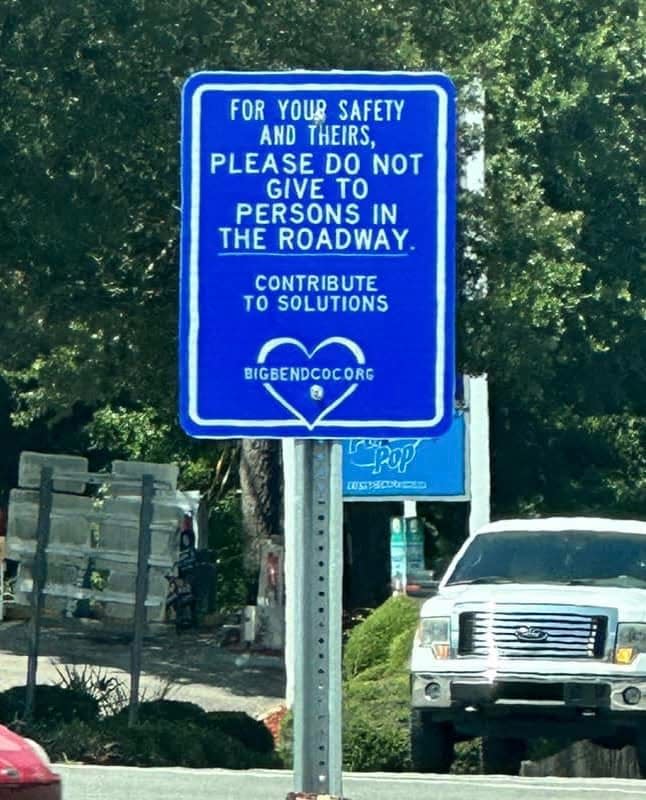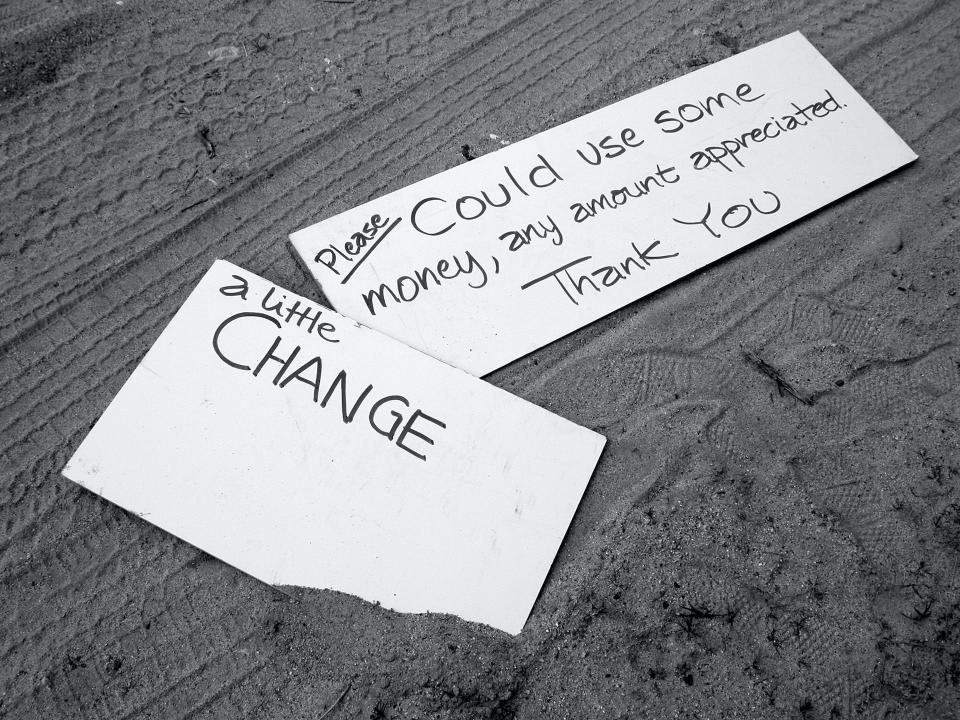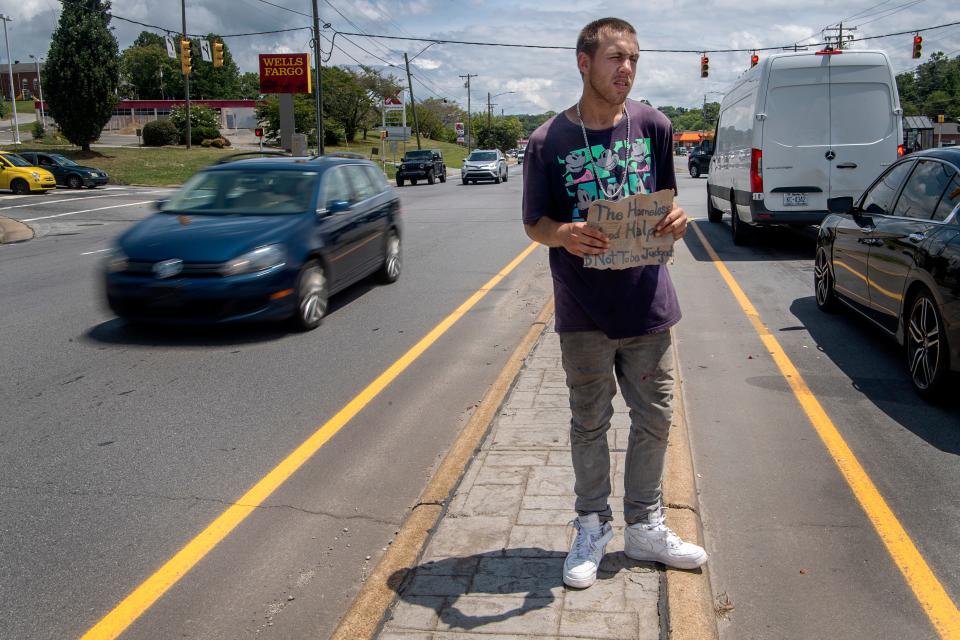Florida lawmaker seeks to strictly regulate panhandling, making it illegal in most cases

- Oops!Something went wrong.Please try again later.
Drivers in the Sunshine State might be accustomed to seeing faces with signs pleading for money and other help, but that may be a thing of the past as lawmakers try to clamp down on panhandling.
Republican state Rep. Alex Andrade of Pensacola has filed legislation to make panhandling illegal in most cases. The bill (HB 759), filed last month, aims to be an add-on to Florida's charitable solicitation law.
The idea is to restrict panhandling based on when and where it occurs. The bill also ups the ante by making the act a potential felony. Andrade said there will be a Senate companion but declined to name the sponsor until a bill is filed there.
As Andrade explained, panhandlers are "soliciting charitable funds ... from the public" just like any traditional charity would: "It struck me as odd that the same activity for whatever reason has never been considered applicable to this statute," he said.
Florida cities have struggled with how to handle the practice, including the state capital. Last year, Leon County leaders launched a sign campaign discouraging drivers from directly giving money to panhandlers and saw a surge of arrests as local police cracked down.
Although his proposal would create what are known as "time, place and manner" restrictions, which lawmakers use to narrowly tailor laws and steer clear of First Amendment violations, experts say it still is not constitutional.

More: Panhandling arrests surge in Tallahassee after police 'directed to address the issue'
Bill would ban panhandling at certain times, in certain places
The current law only regulates charities, which may already apply to panhandlers, according to Andrade, but he thinks the bill is necessary to make it "very clear that it does."
If made law, people would not be able to panhandle from 4 p.m. to 9 a.m. the next day, and would be banned from panhandling:
On all roadways or public sidewalks.
Within 50 feet of a commercially zoned property, bus stop, ATM machine or bank, parking lot, parking garage and public restroom.
Within 100 feet of a child care facility or a school.
Inside a public transportation facility, like a bus depot.
Panhandlers also would be prohibited from asking anyone waiting outside a commercial establishment for money or approaching people in cars to ask for money. They could be arrested if they solicit funds under the influence of drugs or alcohol, touch the person being solicited or use "profane or abusive language."
A first-time offender would be charged with a misdemeanor and a fine of up to $100 and 30 days in jail. Subsequent offenses would result in a fine of $200 and up to 60 days in jail.

Currently, state law requires anyone soliciting charitable donations to register with the state's Department of Agriculture and Consumer Services. It's a potential felony to collect donations if the charity isn't registered, and the bill would make it no different for a panhandler.
The bill amends the definition of charitable solicitation to include asking for a donation — directly or indirectly — on a public road or sidewalk, forcing panhandlers to register if they want to avoid a criminal offense.
Anyone asking for money on the side of the road face a possible misdemeanor if they violate the time, place and manner restrictions and are legally registered. But they could still be charged with a felony if they fail to register —even if they are panhandling within the legal time, place and manner restrictions.
Related: Local attempt to rein in panhandling came before bill filing in Legislature
Andrade wants to put 'public difference in opinion' to rest
Historically, city and county ordinances that regulate the practice of panhandling have been contentious, to say the least, sparking debate about whether they run afoul of the First Amendment. Ordinances have been either deemed unconstitutional or inconsistently enforced, which complicates the way law enforcement reacts.
For instance, Andrade said there was a "difference in opinion" between the sheriffs of Escambia and Santa Rosa Counties, both of which he represents. Santa Rosa County has an ordinance regulating the practice, but Andrade said the Escambia County sheriff told him his hands are tied because their county's ordinance got struck down.
"I can't imagine how difficult it is for some law enforcement agencies in areas that border multiple, different jurisdictions to understand what grounds they have to address something that a lot of members of the public want addressed," Andrade said.

But Dante Trevisani, legal director at the Florida Justice Institute with a background in constitutional law, said the bill is very similar to an ordinance that was struck down in Fort Lauderdale in 2021: "This looks pretty clearly to be unconstitutional to me," he said.
If passed, it will be subject to what's called strict scrutiny, the most stringent level of judicial review. That's because by singling out panhandling, it's targeting a content-based form of speech, he explained. Courts have long ruled that government can't regulate speech based on its subject matter or viewpoint.
To do so, "the government has to show that it's the least restrictive means of serving a compelling government interest."
The bill is saying "you can't ask for money, but you can ask for anything else," Trevisani said. "You can ask for someone to vote or to join a church or something."
Time, place and manner restrictions have to be narrowly tailored to a specific government interest. And "I don't see how they could meet that standard here," he said.
Andrade, however, said the bill is constitutional because it's "a moderate tweak" to an already existing constitutional statute.
"If Girl Scouts can figure out how to register and be compliant with the law, I think grown adults can too," Andrade said.
The Pensacola News Journal, a member of the USA TODAY NETWORK, contributed. Elena Barrera can be reached at ebarrera@tallahassee.com. Follow her on X: @elenabarreraaa.
This article originally appeared on Tallahassee Democrat: Florida lawmaker proposes bill cracking down on panhandling

